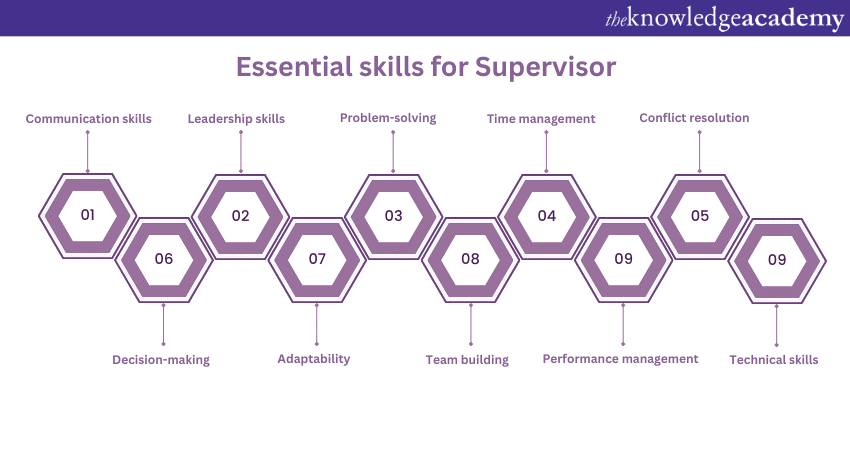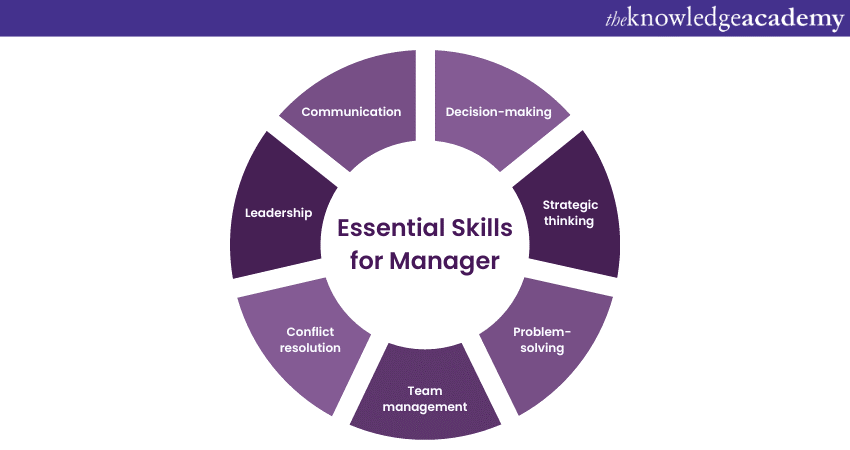We may not have the course you’re looking for. If you enquire or give us a call on 01344203999 and speak to our training experts, we may still be able to help with your training requirements.
Training Outcomes Within Your Budget!
We ensure quality, budget-alignment, and timely delivery by our expert instructors.

In the world of organisational management, the roles of Supervisors vs Managers are frequently used interchangeably, leading to confusion about their distinct responsibilities. While there are undoubtedly overlapping functions, the only way to clear this confusion is by understanding the fundamental differences between them. In this comprehensive blog, you will learn about the roles, responsibilities, and key differentiators that set Supervisors vs Managers apart.
Table of contents
1) Who is a Supervisor?
2) Essential skills of a Supervisor
3) Understanding who is a Manager
4) Essential skills of a Manager
5) Supervisor vs Manager: What’s the difference?
6) Similarities between a Manager and a Supervisor
7) Conclusion
Who is a Supervisor?
A Supervisor is a person who holds a position of authority within an organisation and is responsible for overseeing and managing the work of employees or a specific department. They provide guidance, set expectations, and monitor performance to ensure that work is carried out effectively. They also oversee that the work is in line with the organisation's goals and standards. Supervisors play a crucial role in directing and supporting their subordinates in their daily tasks and responsibilities.

Essential skills of a Supervisor
Supervisors play a crucial role in organisations, and they require a specific set of skills to effectively manage and lead their teams. The following are some essential skills of Supervisors:

1) Communication skills: Supervisors possess strong communication skills to convey instructions, provide feedback, and facilitate effective workplace communication. They listen actively and express themselves clearly and confidently.
2) Leadership skills: Effective leadership involves setting a positive example, motivating team members, and guiding them toward achieving common goals. Supervisors inspire and influence their teams.
3) Problem-solving: Supervisors often encounter challenges and problems in their roles. They are capable of analysing situations, identifying solutions, and making decisions that benefit the organisation and its employees.
4) Time management: Supervisors manage their time efficiently to balance multiple responsibilities and priorities. Being organised and prioritising tasks is essential.
5) Conflict resolution: Conflicts can arise within a team or between team members. Supervisors have the skills to address and resolve conflicts constructively, maintaining a harmonious work environment.
6) Decision-making: Supervisors are frequently required to make decisions that impact their teams and the organisation. They possess abilities to make informed, timely, and well-considered decisions.
7)Adaptability: The business environment is dynamic, and Supervisors adapt to changes and new challenges. Flexibility and the ability to embrace change are important for their role.
8) Team building: Supervisors foster a sense of teamwork and collaboration among their team members. They create a positive and inclusive work culture.
9) Performance management: Supervisors are responsible for evaluating employee performance, providing feedback, and helping team members grow in their roles. This requires a structured approach to performance management.
10) Technical skills: Depending on the industry and the specific department they oversee, Supervisors possess technical skills and knowledge related to the tasks and functions of their team.
Unlock your potential and embark on a journey of personal growth with our Personal Development Training!
Understanding who is a Manager
A Manager is an individual within an organisation who holds a position of authority and responsibility. They are responsible for planning, coordinating, and overseeing the activities and resources of a team, department, or entire organisation.
Managers play a critical role in achieving the organisation's goals and objectives by providing direction, leadership, and decision-making. Their roles and responsibilities can vary widely depending on the level of management they occupy and the specific needs of their organisation.
Essential skills of a Manager
Managers hold positions of greater responsibility within organisations and require a diverse set of skills to effectively lead teams, make strategic decisions, and achieve organisational goals. The following are some essential skills of Managers:

1) Leadership: Managers provide strong and effective leadership to inspire and guide their teams. They set the tone for the work culture and align employees with the organisation's mission and vision.
2) Strategic thinking: Managers think strategically, set long-term goals, and create plans to achieve those goals. They consider the bigger picture and anticipate future challenges and opportunities.
3) Decision-making: Making informed and timely decisions is a critical skill for Managers. They often face complex choices that can impact the organisation's success.
4) Communication: Effective communication is vital for conveying goals, expectations, and feedback to employees, as well as for interacting with higher-level management and external stakeholders.
5) Problem-solving: Managers encounter various challenges, and they are adept at identifying problems, analysing situations, and finding practical solutions.
6) Team management: Managers are responsible for building and leading high-performing teams. This includes recruiting, training, and evaluating employees, as well as fostering collaboration and teamwork.
7) Conflict resolution: Managers are skilled at resolving conflicts within their teams and addressing interpersonal issues constructively.
Unlock the power of meaningful connections in business – join our Building Business Relationships Course and start nurturing valuable professional relationships today!
Supervisor vs Manager: What’s the difference?
Supervisor vs Manager: which one to choose? This is one of the dilemmas of the higher authorities when choosing the right leadership role. However, they forget that these roles are distinct within an organisation, although there can be some overlap in their responsibilities. So, to clear the confusion, first have a look at some key differences between the two:
Scope of responsibility
Supervisors typically oversee a specific group of employees or a department, ensuring that day-to-day tasks are carried out effectively. Their focus is often on operational and immediate issues.
In contrast, Managers have a broader scope of responsibility and are usually responsible for an entire department, division, or even the organisation as a whole. They are more concerned with strategic planning, goal setting, and long-term decision-making.
Decision-making authority
Supervisors often have limited decision-making authority and may need to seek approval from higher-level Managers for significant decisions. On the other hand, Managers have greater decision-making authority and are responsible for making critical decisions that affect their department or area of responsibility. They set policies and make strategic choices.
Leadership and direction
Supervisors provide direct guidance to their team members, ensuring that tasks are completed according to the organisation's standards. Their leadership is more hands-on. While, Managers provide leadership at a higher level, setting the overall direction, goals, and strategies for their department or organisation. They focus on inspiring and aligning their teams to achieve long-term objectives.
Timeframe
Supervisors typically focus on short-term and immediate issues, ensuring that daily tasks are completed, and problems are addressed promptly. Managers work on longer-term planning and decision-making, considering the organisation's future direction and objectives.
Employee development
Supervisors play a role in employee development by providing feedback, training, and guidance to team members to help them perform their current roles effectively. In contrast, Managers are often more involved in talent management and career development. They are involved in succession planning, promotions, and identifying opportunities for employee growth within the organisation.
Reporting hierarchy
Supervisors usually report to higher-level Managers or senior Managers within the organisation. While, Managers may report to senior executives, such as Directors, Vice Presidents, or the CEO, depending on the organisation's structure.
It's important to note that in some organisations, the terms Supervisor and Manager may be used interchangeably, and the specific responsibilities and distinctions between the two roles can vary. Additionally, individuals may transition from supervisor roles to manager roles as they gain experience and demonstrate their leadership abilities.
Enhance your organisational skills with our Organisational Skills Course - join today!
Similarities between a Manager and a Supervisor
Although these roles are distinct, Managers and Supervisors share some similarities in their roles and responsibilities, as both play important roles in overseeing and guiding employees within an organisation. The following are some of the key similarities between a Manager and a Supervisor:
1) Leadership: Both Managers and Supervisors provide leadership to their teams. They set the tone for the work environment, inspire employees, and help them achieve their objectives.
2) Team oversight: Managers and Supervisors are responsible for overseeing the work of their teams or departments. They ensure that tasks are completed efficiently and in line with the organisation's goals and standards.
3) Communication: Effective communication is crucial for both Managers and Supervisors. They convey instructions, expectations, and feedback clearly and ensure that their teams understand their roles and responsibilities.
4) Performance management: Both roles involve monitoring and evaluating employee performance. Managers and Supervisors provide feedback, recognise achievements, and address performance issues when necessary.
5) Problem-solving: Managers and Supervisors encounter challenges and problems in their roles. They must analyse situations, identify solutions, and make decisions to address issues and improve processes.
6) Delegation: Delegating tasks and responsibilities is a common aspect of both roles. Managers and Supervisors entrust team members with specific duties and empower them to take on tasks as appropriate.
7) Conflict resolution: Conflict can arise within a team or between team members. Both Managers and Supervisors need skills to address and resolve conflicts constructively and maintain a positive work environment.
8) Time management: Managing time efficiently is important for Managers and Supervisors. They must balance multiple responsibilities, set priorities, and meet deadlines.
While these similarities exist, it's important to note that Managers typically have a broader scope of responsibility and focus on strategic planning and decision-making for an entire department or organisation. Supervisors, on the other hand, often have a narrower scope and focus on day-to-day operations and the immediate needs of a specific team or department. The specific duties and level of authority can vary depending on the organisation's structure and hierarchy.
Conclusion
We hope now you have understood the difference between Supervisor vs Manager. In the dynamic realm of organisational management, Supervisors and Managers each play a crucial part in achieving success. Thus, it’s crucial to explore the intricacies of both roles, shedding light on their key responsibilities and highlighting the fundamental differences that set them apart.
Ready to supercharge your leadership potential? Register for our Supervisory Skills Course now!
Frequently Asked Questions
Upcoming Business Skills Resources Batches & Dates
Date
 Attention Management Training
Attention Management Training
Fri 7th Jun 2024
Fri 16th Aug 2024
Fri 4th Oct 2024
Fri 6th Dec 2024







 Top Rated Course
Top Rated Course


 If you wish to make any changes to your course, please
If you wish to make any changes to your course, please


